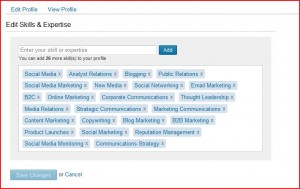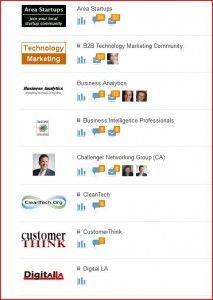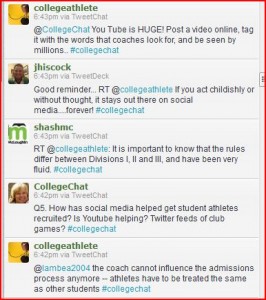Must Read: Mark Meeker’s 2014 Internet Trends
Is Law School Worth the Cost?
Back in September I hosted a panel discussion on #CollegeChat via Twitter whether Law School was worth the cost. It continues to be a hot topic in higher education amdist declining law school applications, rising tuition and debt for graduates, and unstable job prospects. Below is WorldWideLearn’s infographic “Law School 2.0: How law schools and law careers are changing”.
What You Need to Know About Google’s Latest Changes
Erica Moss is the author of this post and is the community manager for Georgetown University’s online masters in nursing program, offering one of the nation’s leading nurse educator programs. She enjoys blogging, TV, pop culture and tweeting @ericajmoss
 Businesses that count on their website to attract customers rise and fall on the strength of their Google ranking. Google’s recent updates to its search algorithms, the so-called Panda and Penguin changes, have had a measurable impact on the ranking of thousands of websites. Whether you have a business website or are thinking of starting one, you need to factor in the “Google Zoo” when developing your online strategy.
Businesses that count on their website to attract customers rise and fall on the strength of their Google ranking. Google’s recent updates to its search algorithms, the so-called Panda and Penguin changes, have had a measurable impact on the ranking of thousands of websites. Whether you have a business website or are thinking of starting one, you need to factor in the “Google Zoo” when developing your online strategy.
According to SEOmoz, Google developers tweak their search algorithms about 500 times per year in order to thwart spammers and ensure the quality of their search results. Most of the Google search engine changes are small, but a couple of recent updates sent traffic levels for some legitimate websites into a nosedive. No one who wants to grow their business with an online presence can afford to ignore the so-called Panda and Penguin changes. Here’s what you should know:
Panda
Released in February 2011, the Panda change penalized websites with poorly written or duplicate content. It lowered the ranking of spammy websites with high ad-to-content ratios and gave higher ranking to sites with unique, relevant and high-quality content.
Penguin
Rolled out in April 2012, this change tightened the Google search algorithm’s ability to filter out web spam techniques, like content spinning, keyword stuffing and unnatural linking. Many sites that went overboard in their use of keywords were hit by the Penguin change.
In the months following the Panda and Penguin changes, SEO experts have determined the new best practices for search engine ranking. Google also provides advice and support in the form of its Search Engine Optimization Starter Guide (available on the Google Webmaster Tools page). A few pointers include:
- Add compelling and useful content to your website in the form of articles, blog posts, forums, social media services and other means. Remove content that’s too generic or duplicated too often elsewhere.
- Attract repeat visitors with fresh, easy-to-read content that’s free from spelling and grammatical errors. Make sure your site is well organized so visitors can quickly navigate to the information they need.
- Incorporate keywords naturally into your content. They should not interrupt the flow of your website’s content or appear to be inserted after the content was written.
- Avoid unnatural anchor text. The text should tell the user something about the external page that’s being linked to from your website.
- Watch your ad-to-content ratio. First and foremost, provide your visitors with relevant content instead of hitting them over the head with advertising.
Other Considerations
In addition to considering Panda and Penguin when constructing and updating a website, it’s important to pay attention to how a website is promoted. Organic links that occur naturally when people discover your content and link to it are the best. This takes time, and Google understands that businesses need website promotion to speed up discovery of their content. Blog posts, press releases, newsletters and RSS feeds are Google-approved promotion techniques. Social media sites like Facebook and Twitter can also be used for promotion, provided the social updates aren’t too frequent. Marketing through article directories like Ezinearticles, Squidoo and HubPages, once a successful strategy for improving search engine ranking, now can hurt more than help a website.
Expert Panel to Discuss Whether Law School Is Worth the Cost on #CollegeChat September 18th
Gabrielle Lyse Brown, director of Diversity Pipeline Initiatives for the New York City Bar, and Akil Bello, owner of Bell Curves, will lead law school discussion on #CollegeChat September 18, 2012 at 9 p.m. Eastern
Amidst widespread news over the last year of unemployed and under employed law school graduates, Gabrielle Lyse Brown, director Diversity Pipeline Initiatives for the New York City Bar, and Akil Bello, owner of Bell Curves – an educational services and test preparation company, will discuss whether Law School is worth the cost on #CollegeChat September 18, 2012 at 9 p.m. Eastern.
During #CollegeChat, Brown http://twitter.com/NYCBarDiversity and Bello, http://twitter.com/akilbello , will discuss with attendees factors prospective law school students should consider before finalizing their plans to attend law school including:
- Is attending Law School amidst all the negative news regarding employment a wise choice?
- How should students weigh the potential benefits of law school against the cost of law school?
- How can students investigate the success of Law Schools in placing graduates in full time law careers?
- How much debt should law school students consider taking on?
- How should students weigh which Law School to enroll in?
- What’s the biggest mistake students make when considering what school to attend?
- Should students only consider top ranked Law Schools? What are important factors to consider?
Gabrielle Lyse Brown is the director of Diversity Pipeline Initiatives for the New York City Bar, where she leads the Association’s efforts to enhance diversity in the legal profession through developmental support for high school, college and law students of color who want to pursue a legal career. In this role, she creates, develops, and administers comprehensive programming that provides inner-city students with academic support and enrichment, professional and substantive skill development, networking/mentoring opportunities and exposure to the legal profession. She is a member of Board of Directors of Practicing Attorneys for Law Students, Inc. (PALS) and the Bronx School of Law and Finance Advisory Board.
Akil Bello is an expert in test preparation and is the owner of Educational Development for Bell Curves. Bello oversees all aspects of the development of programs and materials, as well as the training of teachers. He has worked as a teacher trainer and materials developer at three different test prep companies, bringing his unique humor and intelligence to every endeavor. After spending 15 years teaching every standardized test in the known universe, he joined his brother and father in founding Bell Curves.
About #CollegeChat
#CollegeChat is a live bi-monthly conversation intended for teens, college students, parents, and higher education experts on Twitter. #CollegeChat takes place on the first and third Tuesday of the month at 6 p.m. PT/ 9 p.m. ET. Questions for each #CollegeChat edition can be sent to Theresa Smith, the moderator of #CollegeChat via http://Twitter.com/collegechat, by entering questions online on the CollegeChat Facebook page or by email. More detailed information about signing up for Twitter and participating in #Collegechat can be found at http://pathwaypr.com/how-to-participate-in-a-twitter-chat .
Noted Social Media Scholar to Discuss How the Frequency of College Students’ Facebook Usage Correlates to Academic Engagement on #CollegeChat June 5th
Professor Rey Junco will discuss recent research on college students’ Facebook use #CollegeChat on June 5, 2012 at 9 p.m. Eastern
 Dr. Rey Junco, professor at Lock Haven University and a youth and media lab mentor at the Berkman Center for Internet & Society at Harvard University, will discuss his latest research on the relationship between Facebook use and college student engagement on #CollegeChat June 5, 2012 at 9 p.m. Eastern.
Dr. Rey Junco, professor at Lock Haven University and a youth and media lab mentor at the Berkman Center for Internet & Society at Harvard University, will discuss his latest research on the relationship between Facebook use and college student engagement on #CollegeChat June 5, 2012 at 9 p.m. Eastern.
During #CollegeChat, Junco (http://twitter.com/reyjunco) will discuss research findings from a recent study he authored “The relationship between frequency of Facebook use, participating in Facebook activities, and student engagement” with attendees including:
- Is there a relationship between frequency of Facebook use and activities and student engagement?
- Is there a relationship between frequency of Facebook use and activities and time spent preparing for class?
- Is there a relationship between frequency of Facebook use and activities and time spent in co-curricular activities?
- Why are these results important for higher education administrators, faculty and staff important?
- Why is it important for higher education to design and support interventions that meet students where they are on Facebook and other social media sites?
Rey Junco is a social media scholar who investigates the impact of social technologies on college students. Rey’s primary research interest is using quantitative methods to analyze the effects of social media on student psychosocial development, engagement, and learning. His research has also focused on informing best practices in using social technologies to enhance learning outcomes. For instance, Rey’s research has shown that technology, specifically social media like Facebook and Twitter, can be used in ways that improve engagement and academic performance. Rey has recently published papers on: the relationship between Facebook use, student engagement, and learning, the academic effects of multitasking, the digital divide in cell phone ownership and use, using social media to promote civil discourse on college campuses, and how Twitter can be used for academic purposes in order to increase student engagement and improve grades.
About #CollegeChat
#CollegeChat is a live bi-monthly conversation intended for teens, college students, parents, and higher education experts on Twitter. #CollegeChat takes place on the first and third Tuesday of the month at 6 p.m. PT/ 9 p.m. ET. Questions for each #CollegeChat edition can be sent to Theresa Smith, the moderator of #CollegeChat via http://Twitter.com/collegechat, by entering questions online on the CollegeChat Facebook page or by email. More detailed information about signing up for Twitter and participating in #Collegechat can be found at http://pathwaypr.com/how-to-participate-in-a-twitter-chat .
What’s the Price of Higher Education? An Infographic
 Source: H&R Block
Source: H&R Block
I like this infographic a lot but only as a starting point. Note, the colleges noted as the most expensive school are not necessarily so. They are the most expensive in sticker price but a large number of students do not pay the sticker price. That’s where your grades, course load, SAT and ACT scores, financial need, your athletic or musical talents play a huge part in what you will actually pay. Go to the schools and check out their financial aid section to find out how much is actually doled out. Make sure to aim for schools where your GPA, scores, talents will place you in top 25% of admitted students.








